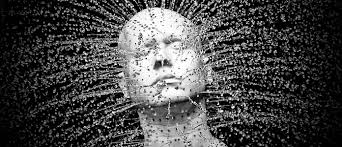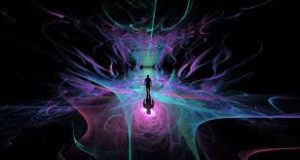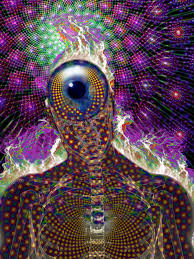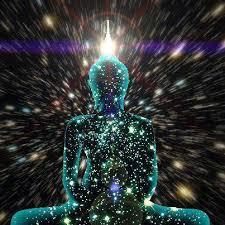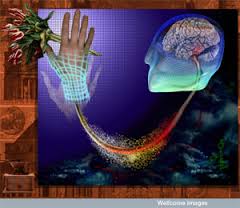Man and woman becomes fully operational in his and her physical body, and while awake can only sense the dream body that had earlier been so real to him and her. He or she now encounters his or her experience from within a body that is subject to gravity and to earth’s laws. He or she must use physical muscles to walk from place to place. He and she sees himself and herself suddenly, in a leap of comprehension, as existing for the first time not only apart from the environment, but apart from all of earth’s other creatures.
The sense of separation is, in those terms, initially almost shattering. Yet man or woman is to be the portion of nature that views itself with perspective. He and she is to be the part of nature that will specialize, again, in the self-conscious use of concepts. He and she will grow the flower of the intellect — a flower that must have its deep roots buried securely within the earth, and yet a flower that will send new psychic seeds outward, not only for itself but for the rest of nature, of which it is a part.
But man and woman looked out and felt himself and herself suddenly separate and amazed at the aloneness. Now he and she must find food, where before his or her dream body did not need physical nourishment. Before, man and woman had been neither male nor female, combining the characteristics of each, but now the physical bodies also specialized in terms of sexuality. Man and woman has to physically procreate. Some lost ancient legends emphasized in a clearer fashion this sudden sexual division. By the time the Biblical legend came into being, however, historical events and social beliefs were transformed into the Adam and eve version of events.
On the one hand, man and woman did indeed feel that he or she had fallen from a high estate, because he and she remembered that earlier freedom of dream reality — a reality in which the other creatures were still to some degree immersed. Man’s and woman’s mind, incidentally, at that point had all the abilities that we now assign to it: the great capacity for contrast of imagination and intellect, the drive for objectivity and for subjectivity, the full capacity for the development of language — a keen mind that was as brilliant in any caveman or cavewoman, say, as it is in any man or woman on a modern street.
But if man or woman felt suddenly alone and isolated, he or she was immediately struck by the grand variety of the world and its creatures. Each creature apart from himself or herself was a new mystery. He and she was enchanted also by his and her own subjective reality, the body in which he and she found himself or herself, and by the differences between himself and herself and others like him or her, and the other creatures. He and she instantly began to explore, to categorize, to point out and to name the other creatures of the earth as they came to his or her attention.
In a fashion, it was a great creative and yet cosmic game that consciousness played with itself, and it did represent a new kind of awareness, but I want to emphasize that each version of All That Is is unique. Each has its purpose, though that purpose cannot be easily defined in our terms. Many people ask, for example: “What is the purpose of my life?” Meaning: “What am I meant to do?” but the purpose of our life, and each life, is in its being. That being may include certain actions, but the acts themselves are only important in that they spring out of the essence of our life, which simply by being is bound to fulfill its purposes.
Man’s and woman’s dream body is still with him and her, or course, but the physical body now obscures it. The dream body cannot be harmed while the physical one can — as man and woman quickly found out as he or she transformed his and her experience largely from one to the other. In the dream body man and woman feared nothing. The dream body does not die. It exists before and after physical death. In their dream bodies men and women had watched the spectacle of animals “killing” other animals, and they saw the animals’ dream bodies emerge unscathed.
They saw the earth was simply changing its forms, but that the identity of each unit of consciousness survived — and so, although they saw the picture of death, they did not recognize it as the death that to many people now seems an inevitable end.
Men and women saw that there must be an exchange of physical energy for the world to continue. They watched the drama of the “hunter” and the “prey,” seeing that each could contribute so that the physical form of the earth could continue — but the rabbit eaten by the wolf survived in a dream body that men and women knew was its true form. When man and woman “awakened” in his or her physical body, however, and specialized in the use of its senses, he or she no longer perceived the released dream body of the slain animal running away, still cavorting on the hillside. He and she retained memory of his and her earlier knowledge, and for a considerable period he or she could now and then recapture that knowledge. He and she became more and more aware of his or her physical senses, however: Some things were definitely pleasant and some were not. Some stimuli were to be sought out, and others avoided, and so over a period of time he or she translated the pleasant and the unpleasant into rough versions of good and evil.
Basically, what made him and her feel good was good. He and she was gifted with strong clear instincts that were meant to lead him or her toward his or her own greatest development, to his and her own greatest fulfillment, in such a way that he and she also helped to bring about the highest potential of all of the other species of consciousness. His or her natural impulses were meant to provide inner directives that would guide him and her in just such a direction, so that he or she sought what was the best for himself and herself and for others.
In some ways the overall consciousness of United States continually becomes involved with — entwined with — the consciousness of adversaries like Russia and Iran: Such consciousnesses, once created, continue to grow and to complicate themselves in new ways within our concept of “time.” Obviously, on an even larger scale of activity, the consciousnesses of all the nations of our world contribute to the challenges, and dilemmas swirling around the Middle East situation.

















![For centuries the Roman Catholic church held [Western] civilization together](https://zzzesus.com/wp-content/uploads/2016/06/ag1.jpg)











